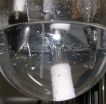South Korean ranks last of the countries in the study in female economic status, access to resources, supportive policy, and participation in the knowledge and STI sectors. While it shows strong participation of women in education at all levels, the country is failing to adequately support women to participate in its growing economic success. A low level of female participation in the knowledge society overall demonstrates a clear lack of correlation between a country's GDP and gender equality.
The full gender benchmarking study maps the opportunities and obstacles faced by women in science in Brazil, South Africa, India, the Republic of Korea, Indonesia, the US, the EU. The study was conducted by experts in international gender, science and technology issues from Women in Global Science & Technology (WISAT) and the Organization for Women in Science for the Developing World (OWSD), and funded by the Elsevier Foundation. The research was led by Dr. Sophia Huyer, Executive Director of WISAT and Dr. Nancy Hafkin, Senior Associate of WISAT.
Despite efforts by many of the countries in this study to give women greater access to science and technology education, research shows negative results in the areas of engineering, physics and computer science. In South Korea:
Women remain severely under-represented in degree programs for these fields – less than 30% in most countries – and less than 15% in South Korea. Overall science and engineering enrollments (including bio and health sciences) are under 21%. In addition, the numbers of women actually working in these fields are declining across the board, dropping to 11% in South Korea. Even in countries where the numbers of women studying science and technology have increased, it has not translated into more women in the workplace. In Korea, the share of women in professional fields remains substantially lower than men, and at less than 50%, is well below the average for member countries of the OECD. Women make up less than 18% of IT workers. In the private sector progress has also been slow, with women making up less than 1% of corporate board directors, and the percentage of women-run businesses with more than one employee at 21%.
"These economies are operating under the existing paradigm that if we give girls and women greater access to education they will eventually gain parity with men in these fields," states Sophia Huyer, the lead researcher and founding executive director of Women in Global Science & Technology. "This has dictated our approach to the problem for over a decade and we are still only seeing incremental changes. The report indicates that access to education is not a solution in and of itself. It's only one part of what should be a multi-dimensional policymaking approach. There is no simple solution."
The data show that women's parity in the science, technology and innovation fields is tied to multiple empowerment factors, with the most influential being participation in the labour force, larger roles in government and politics, access to economic, productive and technological resources, quality healthcare and financial resources. Findings also show that women have greater parity in countries with government policies that support childcare, equal pay, and gender mainstreaming. One of the main findings is that few countries collect consistent and reliable sex-disaggregated data in all of these areas, which inhibits their ability to implement effective supporting policies and programs.
"We found that the absence of any one of these elements creates a situation of vulnerability for economies that want to be competitively positioned in the knowledge economy," Huyer says. "No one country or region is ticking off all the boxes, and some are falling dismally short. This is a tremendous waste of resources. We are wasting resources educating women without following through, and we are missing out on the enormous potential that women represent."
"This broad and ambitious assessment is a critical starting point for measuring the participation of women and girls in science, technology and innovation in emerging and developing worlds," said David Ruth, Executive Director of the Elsevier Foundation, "This study identifies key areas of national strength and weakness, and we hope it will help form the basis of evidence-based policy making and aid going forward."
The report, funded by The Elsevier Foundation, which provides grant programs targeting women scientists in the early stages of their careers, was also supported by futureInnovate.net, a non-profit that supports initiatives that strengthen innovation systems in Canada and around the world.
###
Notes to Editors
The project summary and Key Findings, the Gender Equality and the Knowledge Society Scorecard, as well as graphical scorecards for each country studied, can be found at http://www.wisat.org Please contact Ylann Schemm (y.schemm@elsevier.com) for more information or to arrange an interview with lead researchers Sophia Huyer and Nancy Hafkin.
About the Researchers
As founding executive director of Women in Global Science & Technology, Sophia Huyer has published and spoken widely on international gender, science and technology policy, including Information and Communications Technology (ICT) and social development. She is also research director of the Gender Advisory Board of the UN Commission on Science and Technology for Development and Senior Advisor to the Organization for Women in Science for the Developing World. She was a major contributor to the UNCTAD report Applying a Gender Lens to Science, Technology and Innovation (2011) and the UNESCO International Report on Science, Technology and Gender (2007).
Recently inducted into the Internet Society's Internet Hall of Fame, Nancy Hafkin played a key role in developing Africa's ICT infrastructure through her work with the UN Economic Commission for Africa. She also worked with the Association for Progressive Communications to provide email connectivity to more than 10 countries there. In 2006 she co-edited "Cinderella or Cyberella: Empowering Women in the Knowledge Society," with Sophia Huyer and in 2012 she authored a chapter on gender issues for "Accelerating Development Using the Web: Empowering Poor and Marginalized Populations," edited by George Sadowsky.
About OWSD
The Organization for Women in Science for the Developing World (OWSD) is an international sister organization of TWAS, the academy of sciences for the developing world. OWSD is headed by eminent women scientists from the south, consisting of more than 4,000 members. Created in 1989, OWSD's overall goal is to work towards bridging the gender gap in science and technology. The central role is to promote women's access to science and technology, enhancing their greater involvement in decision-making for the development of their countries and in the international scientific community. OWSD promotes leadership, exchanges and networking for women scientists to assist in the development of national capabilities to evolve, explore and improve strategies for increasing female participation in science. http://www.owsdw.org
About WISAT
Women in Global Science and Technology is a international non profit which promotes innovation, science and technology strategies that enable women, especially those living in developing countries, to actively participate in technology and innovation for development. Women should be able to benefit from access to technologies and full participation in innovation systems. http://www.wisat.org
About The Elsevier Foundation
The Elsevier Foundation is a corporate charity funded by Elsevier, a global provider of scientific, technical and medical information products and services. The Elsevier Foundation provides grants to knowledge centered institutions around the world, with a focus on developing world libraries, nurse faculty and scholars in the early stages of their careers. Since its inception, the Foundation has awarded more than 60 grants worth millions of dollars to non-profit organizations working in these fields. Through gift-matching, the Foundation also supports the efforts of Elsevier employees to play a positive role in their local and global communities. http://www.elsevierfoundation.org
END

